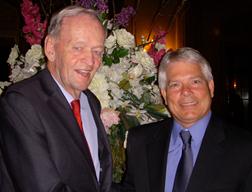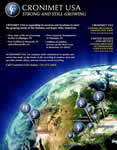|
THE
PULSE
Newsletter of the Canadian Association of Recycling Industries
Volume 17, No. 7, July 2012
PRESIDENT’S PROFILE | CONVENTION WRAP-UP | 2012 BOARD & EXECUTIVE
| FAST FACTS
PRESIDENT’S PROFILE
 Jean Chretien and Dennis Cebula at CARI’s 71st Annual Convention, June 2012.
Last month CARI elected its new President, Dennis Cebula of Keywell LLC. Dennis has been a member of the CARI Board for 16 years, and he and his lovely wife Debbie are fixtures at most CARI events.
This past June marked 30 years in the industry for Dennis, and he has been active in industry associations CARI and ISRI for almost as long. He has an undergraduate degree in Economics and a Masters in Business, and he ‘learned metals’ by putting himself through college working full-time in a small foundry. Dennis got his first job in the scrap industry with David J. Joseph Company after answering an advertisement, and he hasn’t looked back. “There isn’t one day that’s the same,” says Dennis. “There are so many different people, so many commodities to work with, so many issues to deal with. There’s always something new to do.”
Dennis moved to Keywell 25 years ago where he was encouraged to attend ISRI meetings. Once he began handling business in Canada, he started attending CARI meetings as well. Dennis immediately saw the association meetings were a good way to get to know people, and recognized the benefit these associations provide members. “Trade associations makes sense whether you’re a broker, a dealer, a single-yard, a multi-yard… someone is looking out for your interest. That’s what CARI and ISRI do so well for its members on local, provincial, and federal levels.” He began attending Board meetings to learn the inner workings of a trade association and was soon actively participating in both associations. He sat on a number of committees for ISRI’s Michigan Chapter, became a member of their Board, and eventually became Chapter president. At the same time he was attending CARI Board meetings and fall chapter meetings, and when the U.S. representative position on CARI’s Board opened up Dennis enthusiastically took on the job.
Although Dennis is not the first CARI President to work for a U.S.-based company, he is the first non-resident President. The recycling industry has become increasingly integrated over the last decade or so and the flow of scrap back and forth between the U.S. and Canada in particular links the two countries’ industries inextricably. As an active member of the industry and of CARI, Dennis was encouraged by a number of CARI members to take on the role of President. With such support it seemed like the right decision. Dennis believes the benefit to his being a non-resident is that he does not have a fixed attitude and that will allow him to be more sensitive to the Canadian issues.
And the big issues we have to tackle over the next few years, issues such as metal theft, are universal. As President, Dennis feels we need to focus on improving our industry’s image. He says the industry has to share some of the blame for the increasing number of misguided and detrimental metal theft laws coming into place. “In the past, we tried to stay in the background and out of the spotlight and now we have an image problem. The city, provincial, and federal governments don’t realize we’re suffering from the [metal theft] issue more than anyone. They’re looking at us for the solution instead of enforcing existing laws.” Dennis puts this problem down to a lack of understanding, and believes recyclers and their associations must communicate better. “We have to talk about our industry. We need to welcome people in and show them we are legitimate businesses; we are contributing to the tax base, employing local people.”
In particular, Dennis says because ‘all politics are local’ CARI needs its members to become more active and vocal in their local communities. “We need to work harder to improve our image and communicate to governments. I think CARI does a really good job communicating with the federal government, but it’s the local governments we need to concentrate on. They’re putting in new laws and ordinances to appease their constituents rather than looking at the bigger picture.”
Dennis is aware many recyclers aren’t comfortable talking to legislators or to the press and he believes that is where CARI can do a lot of good. Over the next two years he’d like to see CARI more focused on communicating with the various levels of government and with the public to improve our industry’s image. CARI’s focusing on these broad issues will help its members on many fronts and will provide lasting benefits for our industry.
CONVENTION WRAP-UP
CARI’s 71st annual convention in Ottawa was one of the highest attended to date, including a record number of sponsors and exhibitors. The Annual General Meeting held on the Friday morning included reports from Past President Bertrand Van Dorpe and Executive Director Len Shaw, the election of the 2012 Board of Directors, and a keynote address from former Prime Minister Jean Chrétien.
In his report, Bert Van Dorpe said 2011 had been a positive year for CARI. He expressed gratitude to staff and members for assisting him during his presidency, and he encouraged CARI members to continue working together with the Association, with each other, and with outside organizations. Executive Director Len Shaw reported that CARI had concentrated efforts on several key industry issues over the previous yearprimarily metal theft, stewardship programs, trade issues, and problems with railway service. He said CARI would continue working on behalf of industry on all these issues. Shaw also pointed to two of CARI’s successful collaborations, one with the Department of National Defense’s Unexploded Explosive Ordinance Program and the other with the Canadian Nuclear Safety Commission’s Lost Source program.
The 2012 Board elected at the AGM included three new members: Kevin Goldberg of MetroBec Inc. from the Quebec Region seat; Dan Klufas of Federal Metals Inc. for the Alberta Region seat; and Brad Rudover took over the vacant seat for British Columbia.
One of the conference’s particular highlights was the keynote speaker, former Prime Minister Jean Chrétien. He delivered an unscripted, entertaining and witty speech on the current political and economic climate, which ended with an open-mic question and answer session. Chrétien expressed optimism the global economy would begin to stabilize, emphasizing the need for nations to work together to overcome the current crisis. The shifting seat of wealth and power could be economically positive because infrastructure needed by China, India and Africa will generate continued wealth. He said Canada is in a good position moving forward, as we have the “luxury” of so many resources, but stressed the importance of our staying intellectually and innovatively ahead of the curve.
On the final day of the conference, two informative panel sessions offered delegates insight into transportation issues and commodity trends. In the morning ‘Moving Materials’ panel, each of the panelists mentioned imminent or ongoing problems with capacity for their respective modes of transportation. Panelists also expressed a common concern over finding qualified workers. Lou Smyrlis, Editorial Director for Transportation Media Properties summed up the transportation industry’s challenges in four major categories: “Costs, Capacity, Carbon, and Profitability.” In the afternoon session, Pierre Ricard-Desjardins, Director of Industry and Commodity Analysis at Natural Resources Canada gave an overview of the Canadian recycling industry. He said Canada is well positioned to meet domestic challenges and international pressures and that worldwide demand for recycled materials was increasing. Panelists discussed the specific trends for the aluminum, copper, and ferrous sectors, and suggested the commodities market volatility would continue, due in part to economic uncertainty in Europe and the ever-changing cost of oil.
The conference wrapped with a gala celebration where guests enjoyed a spectacular five-course meal modeled after the first-class dinner that was served on the Titanic, and then danced to the “ultimate rock band,” Rebound.
Thanks to all who attended and contributed to the convention’s success. Please mark your calendars for next year’s conference in Halifax, Nova Scotia, June 20–22.
2012 BOARD & EXECUTIVE
QUEBEC REGION
Lorne Kalisky, Vican Trading
Kevin Goldberg, MetroBec Inc.
ONTARIO REGION
Steven Kerzner, ArcelorMittal Ottawa (Bakermet)
George Zubick, John Zubick Limited
Chris Cassell, Glenview Iron & Metal
Jack Petrie, Laidlaw Carriers Inc.
PRAIRIE REGION
Adam Chisick, Urbanmine Inc.
ALBERTA REGION
Dan Klufas, Federal Metals Inc.
BRITISH COLUMBIA
Brad Rudover, Davis Trading & Supply Ltd
U.S. REGION
Dennis Cebula, Keywell LLC
2012 CARI EXECUTIVE COMMITTEE
CHAIR
President – Dennis Cebula
MEMBERS
Vice President – Adam Chisick
Secretary/Treasurer – Chris Cassell
Past President – Bertrand Van Dorpe
Executive Director – Len Shaw
FAST FACTS
 Guest speaker Barbara Fliess told the BIR Ferrous Division at their recent conference that scrap-related export restrictions are becoming increasingly common. The Organization for Economic Development estimates 19% of the world’s iron and steel scrap exports are subjected to some sort of restriction, tax or licensing requirement. Such restrictions are currently being imposed in 30 countries, making trade “far from free.” A subsequent BIR panel expressed alarm at the issue of export restrictions, and said Europe’s domestic supply of ferrous scrap was more than enough to meet needs. However panelists said the global demand was strong; global steel scrap use as a raw material for steelmaking hit a new record of approximately 570M tonnes in 2011. Proceedings of the BIR convention are now available on the BIR website in English, French and German. Guest speaker Barbara Fliess told the BIR Ferrous Division at their recent conference that scrap-related export restrictions are becoming increasingly common. The Organization for Economic Development estimates 19% of the world’s iron and steel scrap exports are subjected to some sort of restriction, tax or licensing requirement. Such restrictions are currently being imposed in 30 countries, making trade “far from free.” A subsequent BIR panel expressed alarm at the issue of export restrictions, and said Europe’s domestic supply of ferrous scrap was more than enough to meet needs. However panelists said the global demand was strong; global steel scrap use as a raw material for steelmaking hit a new record of approximately 570M tonnes in 2011. Proceedings of the BIR convention are now available on the BIR website in English, French and German.
- On July 1, 2012 AQSIQ began using PSI electronic keys for the registration of overseas suppliers and importers. The new system was prompted by a request from BIR and should avoid any potential leak of business-sensitive information. Concerned companies believed data given to AQSIQ (company names, license numbers, description of goods etc.) was been used by some agencies to inform interested companies on the Chinese market and potential customers. AQSIQ recently confirmed to BIR that they would refrain from publishing any lists containing commercial data.
|